Funding for Student Subunits
If your student subunit is interested in hosting a training, workshop, or outreach activity you can request supporting funds from the chapter. Please complete the form and return it to the chapter president for review.
MID-ATLANTIC CHAPTER OF THE AFS
Promoting the conservation, development, and wise use of fisheries

If your student subunit is interested in hosting a training, workshop, or outreach activity you can request supporting funds from the chapter. Please complete the form and return it to the chapter president for review.
hosted by:
Rutgers Student Subunit of the American Fisheries Society
Thirty-three attendees (18 undergraduate students and 15 graduate students) from 4 universities (Rutgers, Rider, Stockton, and Monmouth) attended the ‘Introduction to R course’ taught by Joe Caracappa on December 9, 2018 at Rutgers University. This 5-hour course was aimed to introduce students to a new programming language and gain the necessary tools to independently use this software. Additionally, there was an hour long mentoring match-up over lunch where graduate and undergraduate students were paired up.
This course gained some notice on social media as well! Both the Stockton University subunit and other attending members highlighted their attendance on Twitter. Theses posts were both retweeted by a number of accounts (including the AFS Student & Early Career Professionals).
Everyone really appreciated all the support from the MAC AFS chapter. The event wouldn’t have been possible without it!
This was a very beneficial workshop for all that attended and created a lot of buzz about our subunit and AFS as a whole!
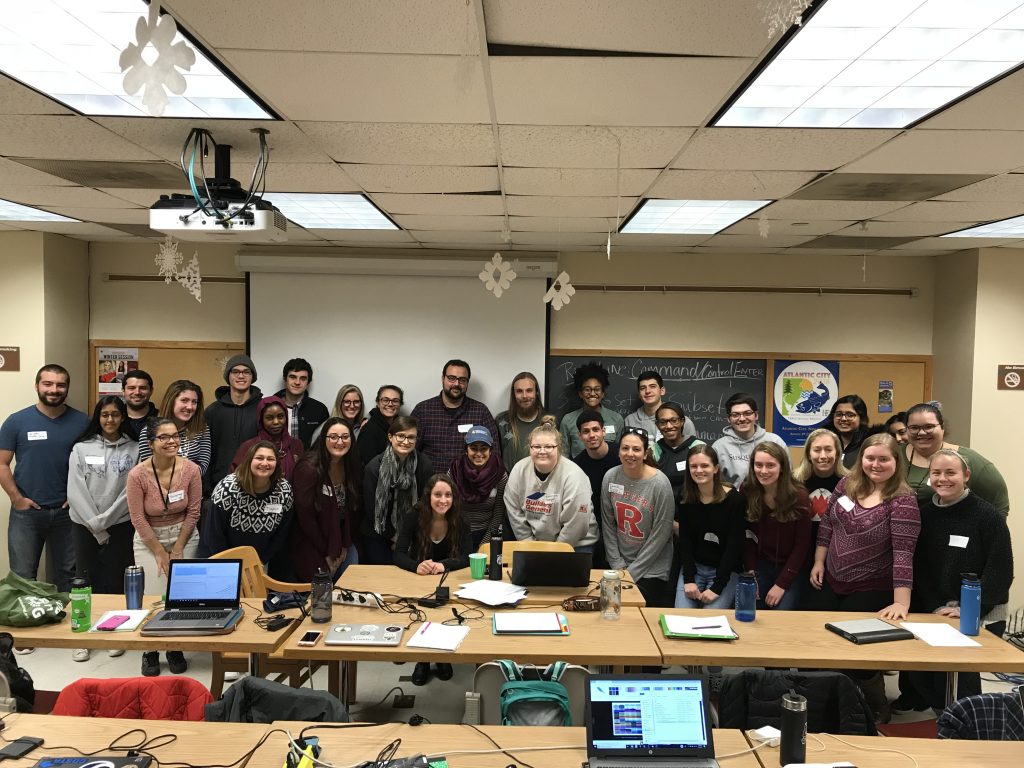


Invasive species are a growing problem world-wide. They can quickly colonize an area and outcompete native species. Delaware has been impacted ecologically and economically by both terrestrial and aquatic invasive species.
Delaware’s Division of Fish and Wildlife has developed an application to track invasive fish in Delaware. They are currently focusing on three primary species – Northern Snakehead, Blue Catfish, and Flathead Catfish. The tool utilizes volunteered geographic information provided by the recreational fishing community, allowing them to see where invasive fish are being caught. The application can be accessed on a phone, tablet, or computer and information about the fish, including location and an image, can be can easily be shared with Fish and Wildlife.
This tool will aid in management efforts, potentially helping to identify new areas of concern. If you have caught an invasive fish, please submit information thought the Delaware Invasive Fish Tracker App. Public reporting is key to preventing further spread of invasive species!
A StoryMap was created to provide information on what has been seen so far through reporting efforts. Visit the Invasive Fish in Delaware StoryMap to learn more about the species of interest as well as other aquatic invasive species being found in our area.
On Saturday, December 7th the Rutgers University Subunit of the American Fisheries Society hosted an Introduction to GIS & CV writing workshop in New Brunswick. This hands-on 6-hour course introduced participants to ArcGIS and provided students an opportunity to learn how to view, manipulate and analyze spatial data. Students were able to work through two analysis independently while using actual data.

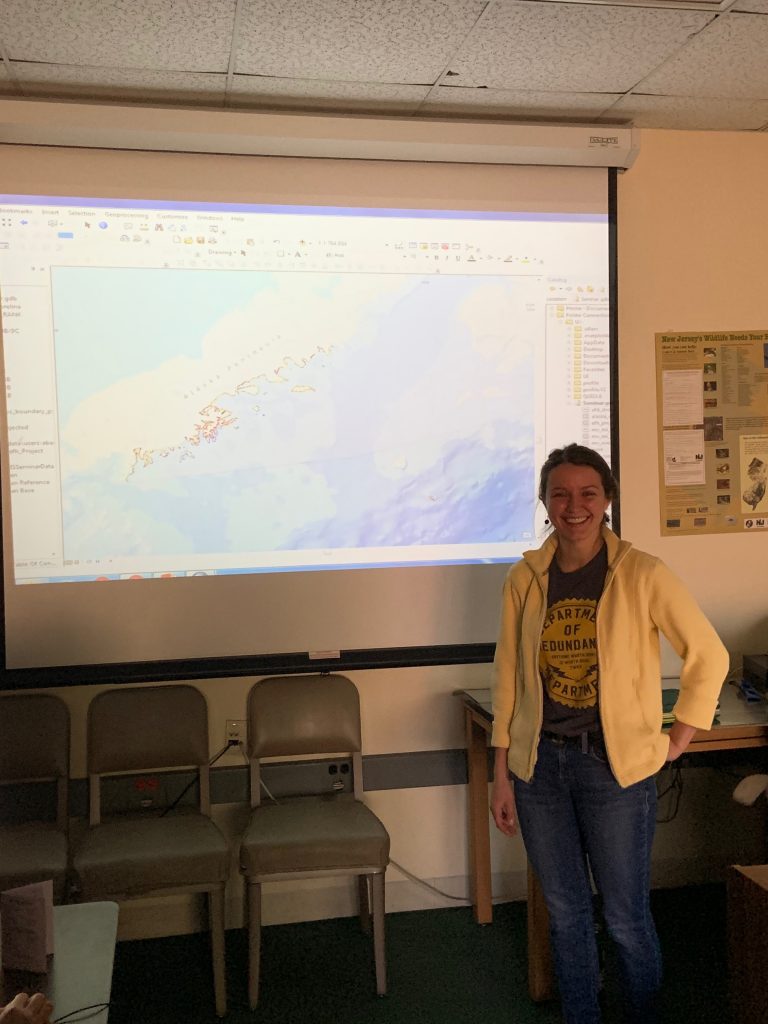
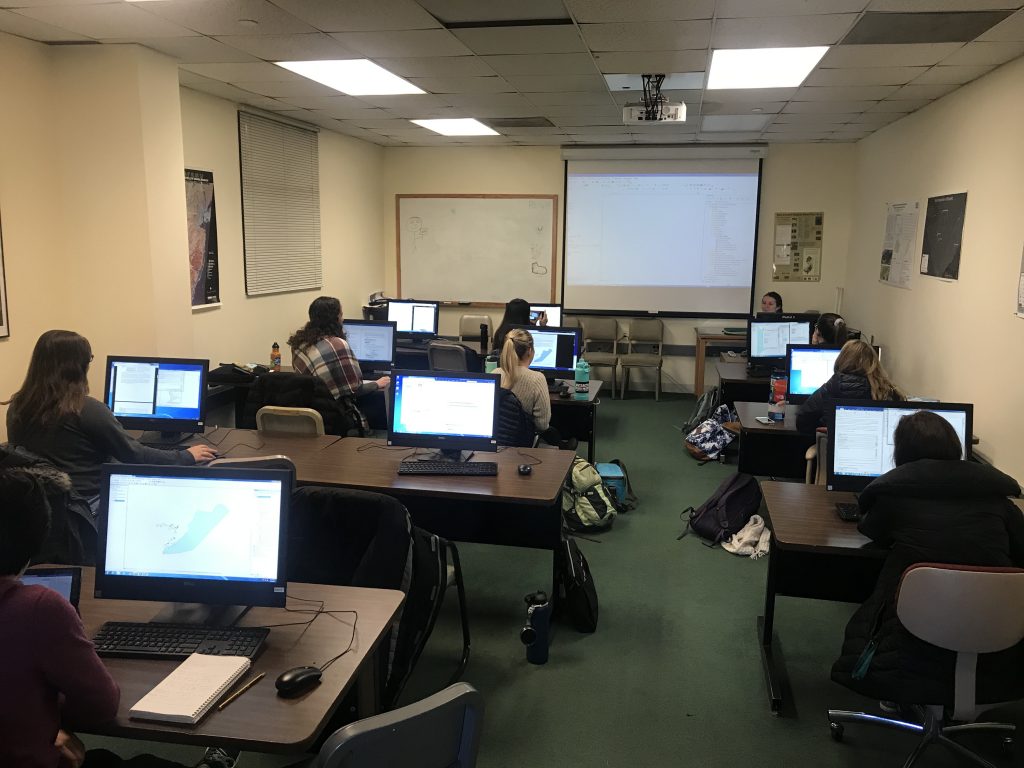
Additionally, students participated in an interactive CV Workshop where they discussed how to best build a CV to make themselves as competitive as possible for graduate school, jobs, and scholarships. This workshop was advertised widely within Rutgers University and to both the MATES and Stockton Subunits. This course was attended by 12 students from the Rutgers Subunit.
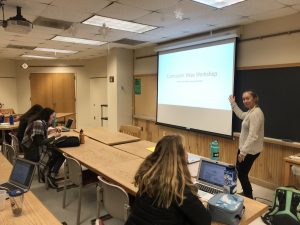

The Mid-Atlantic Chapter of the American Fisheries Society has an Amazon Smile account where 0.5% of proceeds from eligible purchases are donated back to the Chapter. The Amazon Smile website has all the same products as the Amazon website with the added benefit of being able to raise money for non-profits like us. The Chapter uses the money donated by Amazon for the sole purpose of funding Student Subunit activities! Follow the link below to start supporting the Mid-Atlantic Chapter with your Amazon Smile purchases.
And now now you can access AmazonSmile through your Amazon Android App (iPhone compatibility coming soon). Directions to activate Amazon Smile on your Amazon app can be found here.
Hosted by the Stockton University Student Subunit of The American Fisheries Society
On Sunday April 14, 2019 Stockton University’s Student Subunit of the American Fisheries Society held a Joint Meeting with fellow Mid Atlantic Chapter Subunits, Rutgers University and the Marine Academy of Technology and Environmental Sciences (MATES), which was held at the new Stockton University Atlantic City Campus. The meeting consisted of two keynote speakers: Jeff Brust, an administrator within Marine Fisheries of the NJDEP, Jeff conducted a presentation on A Day in the Life of a Marine Fisheries Administrator: A Look into the Development of Policy and Regulations. The second Keynote Speaker was Captain Jason Snellbaker who highlighted the importance of enforcement of enacted regulations by Marine Fisheries, which Jeff had gone into detail about, through examples of cases that he has encountered over his extensive career as a Conservation Officer within the Marine Enforcement Bureau. Following the keynote speakers time was allotted for a lunch break and networking across the industry professionals, graduate students, undergraduate students, and high school students in attendance. Once the networking session concluded students from each subunit had the opportunity to present their research to members in attendance. This was conducted in two separate sessions, the first consisting of posters in which attendees had the chance to freely roam to hear about each project and ask questions, and the second consisting of powerpoint presentations developed by each student presenter. The poster session consisted of four posters from MATES Students: Teresa Brostow, MATES ’19, “Analysis of Effects of Location and Weight in Crab Pot Movement in Barnegat Bay, NJ” (Study focusing on the movement of commercial versus recreational crab pots); Makenzie Fries, MATES ’21, “The Effect Various Bycatch Reduction Device Shapes have on Malaclemys terrapin and Callinectes sapidus” (focusing on the shape of BIRDs in crab pots and how they affect catch and bycatch); Steven Holmberg, MATES ’20, “The Effectiveness of Bycatch Reduction Devices (BRDs) on Reducing Bycatch Without Reducing Crab Pot Efficiency” (compared three BRD types and measured catch per unit effort); and Eric McGivney, MATES ’20, “Study of the Rate of Degradation of Crab Pot Bycatch Reduction Devices” (looked at the degradation of crab pot escape panel features).
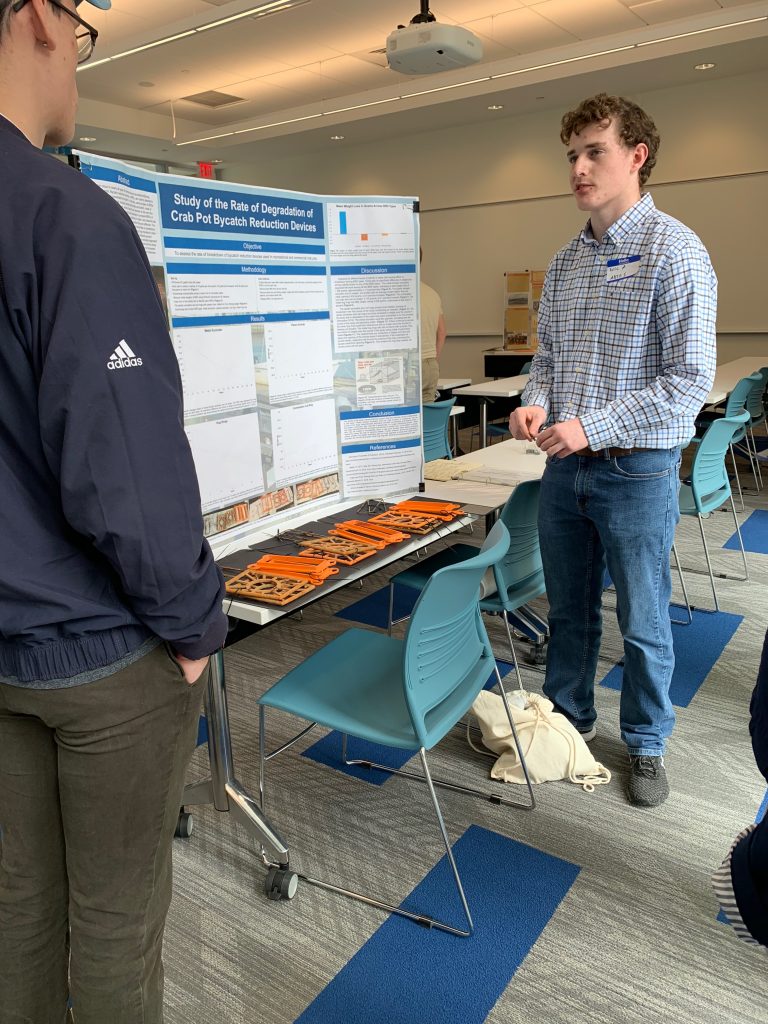
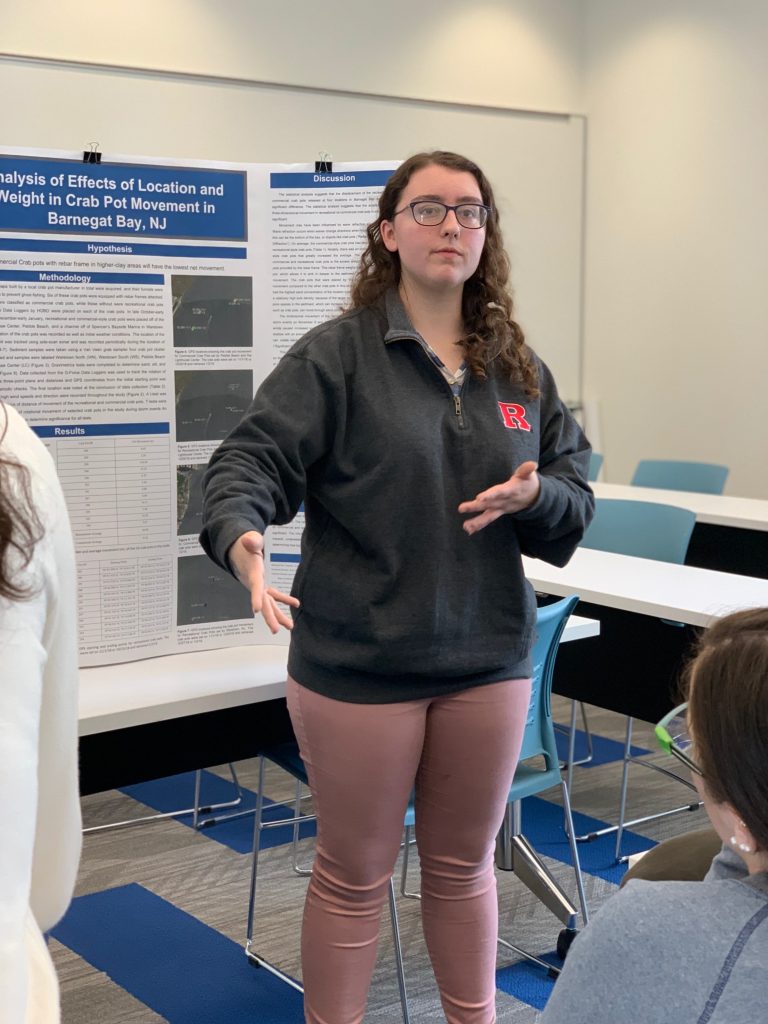
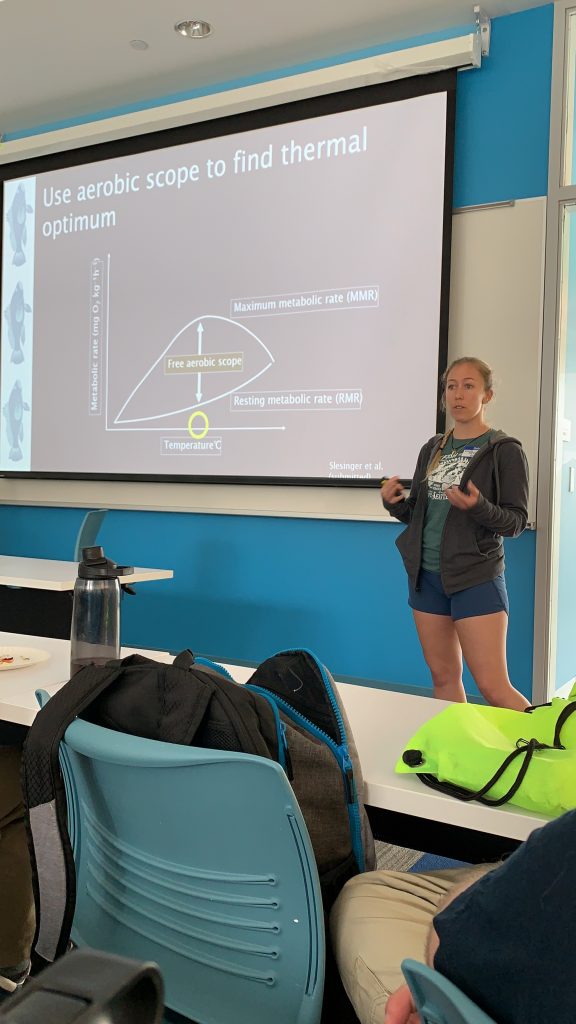
Powerpoint presentations were conducted by Penny Demetriades, MATES ’19, “A Comparative Analysis of the Prevalence of Pleurogonius malaclemys Parasitic Infection of Ilyanassa obsoleta in Barnegat Bay, New Jersey” (Study of a parasitic Trematode prevalent on mud snails along the east coast of the U.S.) as well as Emily Slesinger, Rutgers, “Black sea bass physiology in the context of seasonal variability and long-term climate change” and Nicole Deck, Rutgers, ”Caribbean Stony Coral Disease Prevalence”. To wrap up the day we completed a tour of the Stockton Atlantic City Campus to showcase the amazing amenities the new campus has to offer. Overall the meeting was seen as a great success. Students were very engaged and had great opportunities to expand upon their AFS experience. Continued collaboration and communication across subunits was developed and cultivated within this meeting and we were very thankful for all that attended as well as all that presented.
Hosted by Rutgers University Student Subunit of the American Fisheries Society
On Saturday April 27th, 2019 nearly 94,000 people attended Rutgers Day where the Rutgers Student Subunit offered a fish printing activity for guests of all ages. Fish printing, more formally known as Gyotaku, originated in Japan where fishermen would make prints of fish in order to keep detailed records of the species and sizes of the fish they caught.
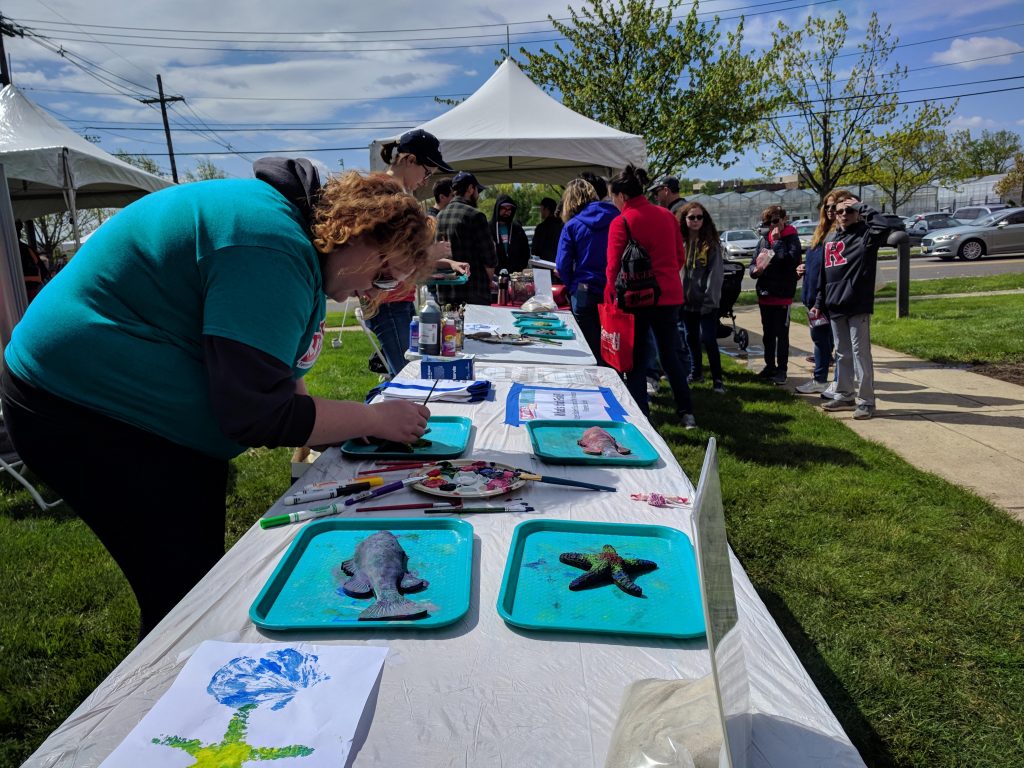
Although the “fish” used for this activity were not real (they were actually made of rubber), Subunit members were still able to engage participants in a fun activity while teaching them about the creatures they were painting. While we certainly had some enthusiastic adults make fish prints, children were the main participants in this activity with the seastar being their favorite rubber sea creature to print.
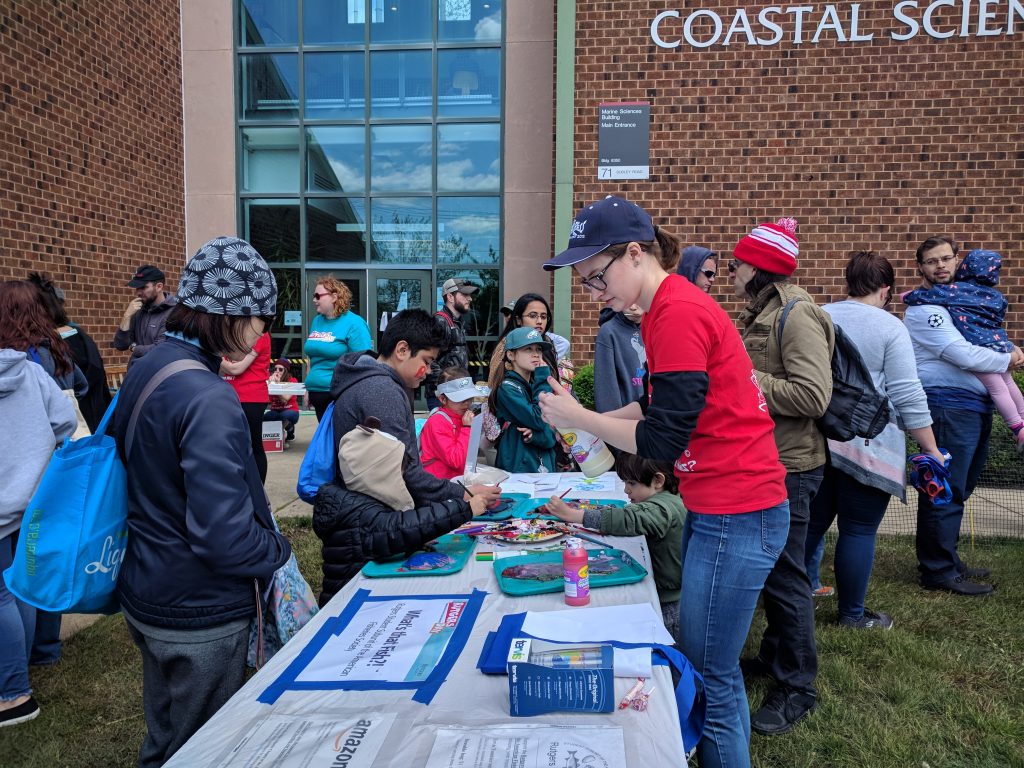
In addition to the Subunit table, our colleagues at the Center for Fisheries and Ocean Sustainability had an interactive fish identification game, a short trivia quiz, and demonstrations of field gear fisheries scientists use. On top of that, the Oceanography Graduate Student Association hosted a Jersey coast touch tank filled with local fish and invertebrate species, which drew a large crowd. Overall, Rutgers Day was a success and Subunit members certainly played a large part in educating the public about fish and fisheries. Our participation in Rutgers Day would not have been possible without the support of the Mid-Atlantic Chapter of the American Fisheries Society and Jenny Shinn at the Haskin Shellfish Research Laboratory.
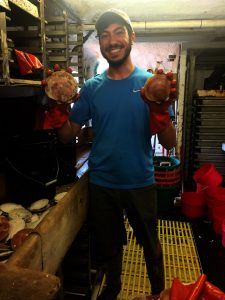 We want to take some time to focus on our students and get to know them and the amazing things they are doing.
We want to take some time to focus on our students and get to know them and the amazing things they are doing.
Meet Mike Acquafredda! He won the student award at our MAC annual meeting in October and has been involved in a wide variety of research.
What made you get into your line of work?
Mike: I’m currently a PhD Candidate at the Rutgers University Haskin Shellfish Research laboratory. My dissertation research is broadly focused on ways to diversify the Northeast’s aquaculture sector. Aquaculture is a perfect marriage between my two greatest passions: marine biology and food! I first learned about aquaculture and became interested in the field when I organized an oyster gardening program for my Eagle Scout Project.
What did you do before coming to work at the Haskin Shellfish Research Lab (HSRL)?
Mike: Before starting graduate school at HSRL, I was an undergraduate at Tufts University. At Tufts, I worked in two separate laboratories conducting independent research with Dr. Kelly McLaughlin. I studied heart development and heart disease in the amphibian model species, Xenopus laevis. With Dr. Jan Pechenik, I studied the effects of hypoxia on a pollution-indicating polychaete, Capitella teleta.
What is (or has been) the most rewarding part of your job?
Mike: The most rewarding part of my job is knowing that my research is helping to support the aquaculture sector, which is the fastest growing part of the food industry.
What is the one thing on your bucket list you’d like to accomplish in the next five years?
Mike: In the next five years, I hope I can scratch off swimming with stingless jellyfish in Palau from my bucket list.
What’s your favorite holiday, and why?
Mike: My favorite holiday is Christmas Eve. In my family, we celebrate Christmas Eve with a smorgasbord of seafood. It’s an Italian tradition known as the Feast of the Seven Fishes.
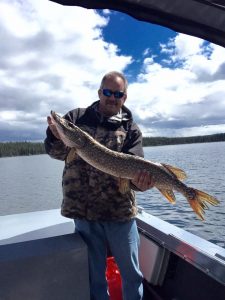 President-Elect Michael Greco, better known as “Grec” by his co-workers. Mike received his B.S. in Fisheries Mgt. and Wildlife Mgt. from Delaware State College (now University) in 1991. He started with the Delaware Division of Fish and Wildlife in 1992 as a seasonal advancing to Environment Scientist IV in 2012. Mike currently serves as the project leader for the Division’s juvenile and adult trawl surveys and the Division’s oyster survey. He also represents the Division on a number of technical committees for the Atlantic States Marine Fisheries Commission including, but not limited to, Weakfish, Atlantic Croaker and Spot. In addition, he is the Division’s representative on the National Marine Fisheries Service take reduction teams for Bottlenose Dolphin, Harbor Porpoise and Atlantic Large Whales. He has been a member of AFS since 1991 and obtained his AFS certification in 2012. Professionally, his interest is in field work (isn’t everyone’s) and fish ageing. Outside of work, he is active with a local volunteer fire company since 1993 where he has served as Fire Chief (2010-2016) and President (1998-2002) in addition to other administrative and fire line officer positions. He is an avid Philly sports fan, especially Flyers hockey.
President-Elect Michael Greco, better known as “Grec” by his co-workers. Mike received his B.S. in Fisheries Mgt. and Wildlife Mgt. from Delaware State College (now University) in 1991. He started with the Delaware Division of Fish and Wildlife in 1992 as a seasonal advancing to Environment Scientist IV in 2012. Mike currently serves as the project leader for the Division’s juvenile and adult trawl surveys and the Division’s oyster survey. He also represents the Division on a number of technical committees for the Atlantic States Marine Fisheries Commission including, but not limited to, Weakfish, Atlantic Croaker and Spot. In addition, he is the Division’s representative on the National Marine Fisheries Service take reduction teams for Bottlenose Dolphin, Harbor Porpoise and Atlantic Large Whales. He has been a member of AFS since 1991 and obtained his AFS certification in 2012. Professionally, his interest is in field work (isn’t everyone’s) and fish ageing. Outside of work, he is active with a local volunteer fire company since 1993 where he has served as Fire Chief (2010-2016) and President (1998-2002) in addition to other administrative and fire line officer positions. He is an avid Philly sports fan, especially Flyers hockey.